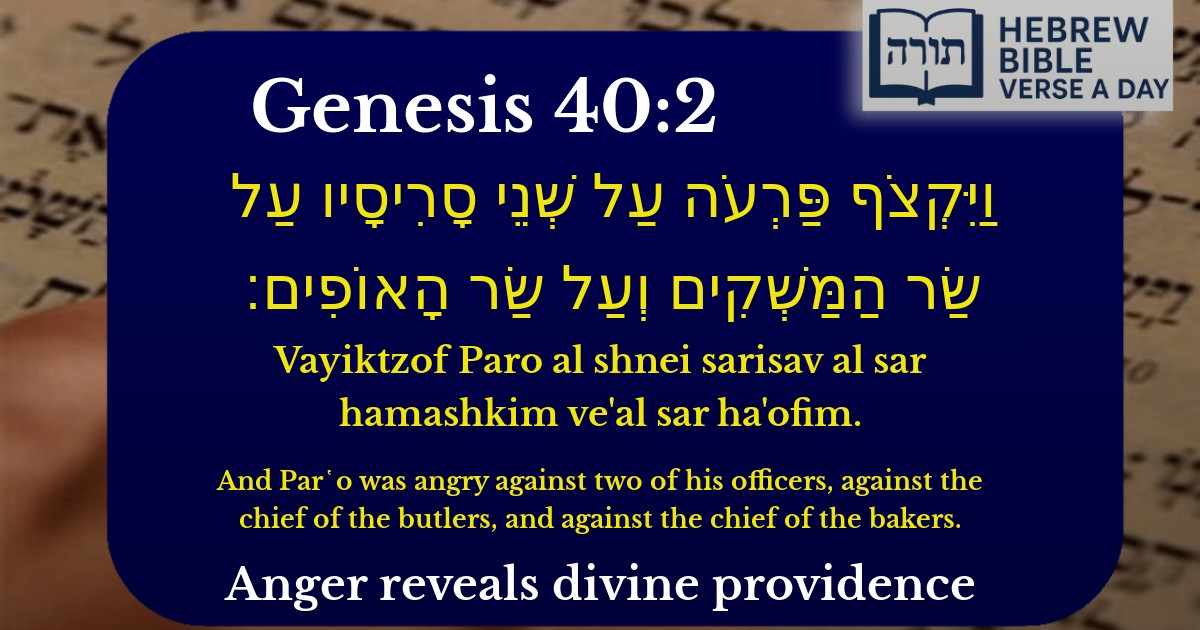Join Our Newsletter To Be Informed When New Videos Are Posted
Join the thousands of fellow Studends who rely on our videos to learn how to read the bible in Hebrew for free!
Hebrew Text
וַיִּקְצֹף פַּרְעֹה עַל שְׁנֵי סָרִיסָיו עַל שַׂר הַמַּשְׁקִים וְעַל שַׂר הָאוֹפִים׃
English Translation
And Par῾o was angry against two of his officers, against the chief of the butlers, and against the chief of the bakers.
Transliteration
Vayiktzof Paro al shnei sarisav al sar hamashkim ve'al sar ha'ofim.
Hebrew Leining Text
וַיִּקְצֹ֣ף פַּרְעֹ֔ה עַ֖ל שְׁנֵ֣י סָרִיסָ֑יו עַ֚ל שַׂ֣ר הַמַּשְׁקִ֔ים וְעַ֖ל שַׂ֥ר הָאוֹפִֽים׃
וַיִּקְצֹ֣ף פַּרְעֹ֔ה עַ֖ל שְׁנֵ֣י סָרִיסָ֑יו עַ֚ל שַׂ֣ר הַמַּשְׁקִ֔ים וְעַ֖ל שַׂ֥ר הָאוֹפִֽים׃
🎵 Listen to leining
Parasha Commentary
📚 Talmud Citations
This verse is quoted in the Talmud.
📖 Berakhot 55a
The verse is referenced in a discussion about dreams and their interpretations, relating to the story of Pharaoh's butler and baker.
📖 Chullin 95b
Mentioned in the context of discussing the anger of Pharaoh and its consequences, as part of a broader discussion on leadership and divine providence.


Pharaoh's Anger Against His Officers
The verse states: "And Pharaoh was angry against two of his officers, against the chief of the butlers and against the chief of the bakers" (Genesis 40:2). This incident occurs in the context of Yosef's (Joseph's) imprisonment, where he later interprets the dreams of these two officers.
Rashi's Explanation
Rashi (Rabbi Shlomo Yitzchaki) comments that Pharaoh's anger was directed at these two officers because they had failed in their duties. Specifically:
Rashi cites the Midrash (Bereshit Rabbah 88:2) as the source for this explanation, emphasizing that even minor negligence in serving a king—especially a ruler like Pharaoh—could lead to severe consequences.
Ibn Ezra's Perspective
Ibn Ezra offers a more straightforward interpretation, suggesting that Pharaoh's anger was due to a suspicion of treason or conspiracy. The term "סָרִיס" (saris), often translated as "officer," can also imply a high-ranking court official who may have been involved in palace intrigues. Their imprisonment was a precautionary measure.
Rambam's Insight on Kingship
Rambam (Maimonides), in Hilchot Melachim (Laws of Kings), discusses the severity with which a monarch must govern to maintain order. Pharaoh's reaction aligns with the principle that a king must swiftly address even perceived disloyalty among his closest advisors to prevent rebellion or chaos in his kingdom.
Midrashic Interpretation
The Midrash (Bereshit Rabbah 88:2) elaborates that these events were orchestrated by Divine Providence to bring Yosef closer to his eventual rise to power. The officers' imprisonment led to Yosef interpreting their dreams, which later facilitated his introduction to Pharaoh.
Symbolism in Their Roles
Some commentators note symbolic significance in the roles of these two officers:
Their downfall and Yosef's involvement set the stage for his future leadership in Egypt.